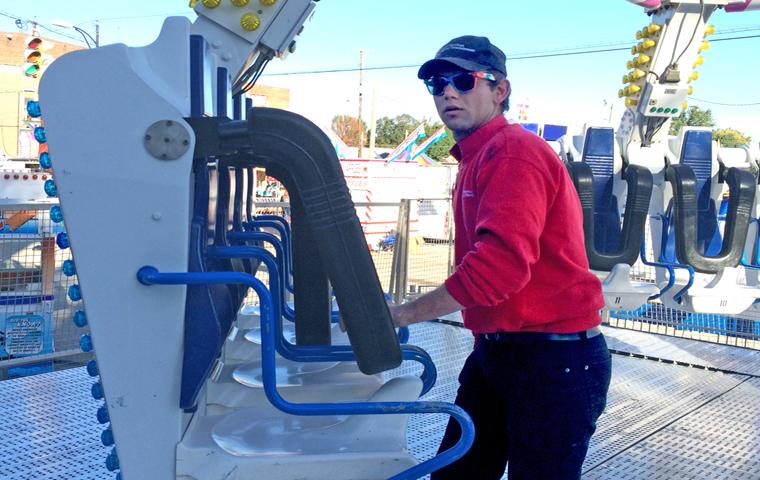
Neil Campbell, who was born and raised in South Africa, became taken aback when a person asked him the following question at a carnival:
“Well, why are you white?”
Campbell, 22, works for North American Midway Entertainment, the company in charge of ride operation and maintenance at the West Side Nut Club Fall Festival, as the foreman for the Freakout.
His unique background has roused many-a-question among attendees of the many events he has worked over his four years of employment, such as inquiries about if his parents are also white, if there are cars in South Africa and how he came to be in the U.S.
“Well, they put us all in a big container and gave a sack of potatoes and a big can of water and whoever makes it, makes it,” Campbell said he told a curious young lady.
He said he shrugs most of the comments off as the majority of the people he encounters are friendly and genuinely interested.
But one stigma seems to be roused by something other than his heritage; the fact that he is a “carny.”
A majority of the ride operators at North American Midway Entertainment are twenty-something’s from South Africa saving money for various reasons back home. They stay in traveling bunkers throughout the eight to nine month season, working festivals in Indiana, Michigan, Ohio and sometimes even in places like Mobile , Alabama or Miami, Florida.
Campbell, at first, saved money to help his parents make a down payment on a house, and is now saving money to attend college. He said many carnival attendees tell him that he doesn’t “look like a carny.”
“That’s because I am not. I just work at a carnival,” he said.
The hardest part was the first season away from his family, he said.
Campbell lived in Durban before he came across seas and left behind his parents, two brothers, a step-brother and a step-sister.
“I remember we were in Flint, Michigan, and my brother was in the hospital,” he said. “It’s hard when you’re over here because there’s the time difference so you can’t really ask your parents like, ‘How’s it going?’ You’ve got to wait like seven, eight hours before they can reply. So it’s pretty hard not knowing what’s going on back home.”
Mostly, the workers do not know each other when they apply for the job, so unless they come over with a friend or a relative, they know no one.
“That’s probably one of the hard things, too, is you make friends in a certain area and then next week you’re out of there, and so you don’t have a lot of time to get to know someone really good,” Campbell said.
Armandt Beck , 23, lives in Cape Town with his mother, brother and sister, and, although he is in his first season with the company, he has not had much trouble adjusting.
“No stresses really. It’s fun. It’s amazing,” Beck said. “It’s hard work, but there’s fun times as well.”
Beck had just finished college with an internet technologies degree, but decided it wasn’t for him. When he heard about the opportunity to travel for work, he jumped at the chance. He said he enjoys the bond he makes with fellow South Africans.
“After work, you go back to your bunkers and you just chill for the day and speak to your friends about what happened during the day,” he said. “It’s like a big family that you’re apart of. That’s probably the biggest thing that I like about that.”
The biggest adjustment for Beck was dealing with the vast climate change.
“We don’t get snow a lot in South Africa,” he said. “It’s cold; it’s a little bit difficult to get used to it. But, America’s got a lot of tick clothes.”
The temperature hovered in the low-70s at 10 p.m. Monday at the festival, but Beck, Campbell and Rudi Cronje wore thick winter coats as they sat in a trailer behind West Branch Library, blasting the heat.
Cronje said tornado warnings took some getting used to. One night, they all had to spend the evening inside a Walmart during a severe weather threat.
Cronje applied for the job with his girlfriend, and now in their second season, they still work together. He said they plan to work with the company for a few more years before settling down back home.
His parents, two brothers and two sisters remain in his hometown, Virginia, Free State. Cronje said it is not too different from U.S. cities except the poverty it much worse in back home.
Quality bar-b-que and biltong (similar to beef jerky) are two foods Cronje misses most.
Campbell’s favorite part about the work is the set-ups and tear-downs, he said. Since he stays with the same ride everywhere he travels, an inevitable attachment is formed.
“After awhile it becomes like your child,” he said. “You get so used to it that you know when something needs to be done; you know exactly what needs to be where.”
The 93rd annual Fall Festival continues through Sunday.
Wilhelm Esterhuyseis, a supervisor at North American Midway Entertainment, said that the carny stereotype is wrong.
“This is a job; a general job. They’ve got a mis-perception about a carny,” Esterhuyseis said. “These guys are, you can look at them, they are all fully shaved, they clean up, they’re nice-dressed. What’s ‘carny’ about it?”
Esterhuyseis said the term carny does not apply to them.
“We are not carnies,” he said. “We’re showmen.”


